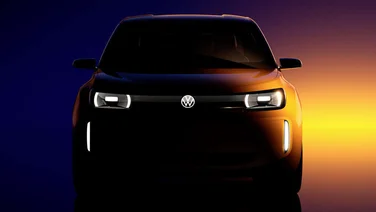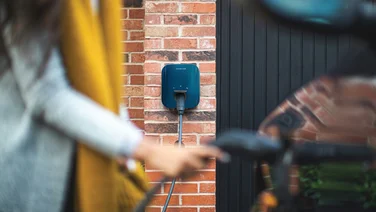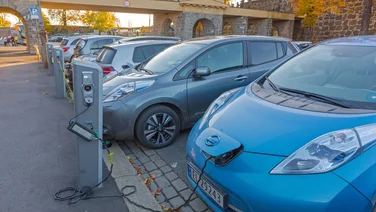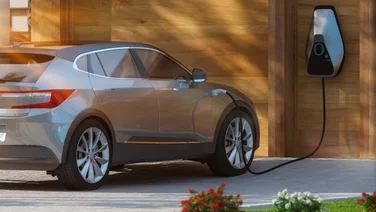- Best overall: Powerverse VCHRGD Seven
- Best for solar panels: Myenergi Zappi
- Best customer service: Hypervolt Home 3 Pro
- Best looking charger: Andersen A2
- Best small charger: Wallbox Pulsar Max
- Best for beginners: Easee One
- Best budget charger: Project EV EVA-07S-SE-C
- Best app: Ohme Home Pro
- Best for extreme weather: Rolec Wallpod
- Best for security: EO Mini Pro 3
- Best for remote support: Pod Point Solo 3S
- Our methodology explained
- Next steps
- Save hundreds of pounds a year with your own electric vehicle charger
- We rated the 11 best home EV chargers against 10 key criteria
- Criteria include warranty, value for money and customer feedback
- Read our guide before choosing the best EV charger for your home
If you have an electric vehicle (EV) or plug-in hybrid car, or you’re thinking of making the switch, it pays to buy your own home EV charger.
Charging your EV from home makes life easier and could save you a huge amount of money. You’ll save hundreds of pounds a year on public charging fees, especially if you set your charger to operate during your energy tariff’s off-peak hours. You could even cut your energy bill and carbon footprint to zero by linking your charger to your solar panels.
However, a home EV charger is a sizeable upfront investment. The average charger costs between £800 and £1,200 to buy and install. Even the cheapest home EV chargers we looked at for this article don’t leave much change from £600, and installation adds around £200 to the bill.
We’re here to help you find the best home EV charger for your budget and your needs. Our team of researchers analysed the UK home charging market and whittled the field down to the best.
When choosing our top 11, we focused on criteria including affordability, appearance and ease of use, but we also prioritised chargers with excellent warranties, companion apps and verified customer reviews. See our methodology below for more information on how we selected the best chargers.
Ready to collect a few quotes? Fill in our form, and our hand-picked selection of home EV charger installers will be in touch with free quotes for you to compare.

Best overall: Powerverse VCHRGD Seven

The VCHRGD Seven may not have the catchiest name, but this new charger rose to the top of our list thanks to its versatility, ease of use, smart functions and value for money.
The unit measures 34cm at its longest, and looks neat and modern with its matt black cover and LED status light. Despite its swish appearance, this is one of the cheapest home EV chargers you can buy, with both the tethered and untethered models to be found for under £500. Make sure you budget at least £200 for installation.
We recommend going for the tethered version if you’re a home charging beginner, because its permanently-attached cable is easier and more convenient to use. On the other hand, the untethered version supports more connection types and is more tidy, because you can remove the cable and stash it in your garage or boot.
Whether you opt for tethered or untethered, this charger’s smart functions help you get your money’s worth by integrating with your solar panels and automatically balancing power sources. Wi-Fi and Bluetooth are supported, and the companion app connects to the VCHRGD Cloud to let you control your charging, track your history and utilise smart tariffs.
- Superb value at around £500-600 for a tethered or untethered unit before installation
- Three-year manufacturer's warranty is above average
- Fast charging power of up to 7.4kW is top of the range for home chargers
- UK-based Powerverse offers charger plus installation packages for less than £900, which is good value
- Customers rate professional service with good communication
- The app has plenty of features but could be more intuitive to use
Best for solar panels: Myenergi Zappi

The Myenergi Zappi has three charging modes: Fast, Eco and Eco+. ‘Fast’ charges your car as quickly as possible; ‘Eco’ saves money by adjusting to your energy usage; and ‘Eco+’ automatically redirects any surplus energy from your solar panels to your electric vehicle. This ingenious idea makes the Zappi an ideal choice if you’re intending to switch completely to renewables.
There’s plenty more to love about the Zappi. Its app is excellent, with an intuitive design that displays clearly which source your vehicle’s energy is coming from, and it works with other Myenergi products to give you full smart home control.
Like the Powerverse VCHRGD Seven, the Zappi comes in tethered and untethered models (tethered model pictured above). It’s not the most modern-looking EV charger, and both the black and white options look a little like defibrillators, but it’s good value at around £665 before installation.
- Innovative integration with solar panels makes this a great choice for anyone with a PV system
- Three charging modes are quick and easy to switch between
- Good value at around £665 for tethered or untethered before installation
- Companion app is easy to use and full of ways to monitor and manage your charging
- Heavier than average, and looks clunky compared with newer rivals
Best customer service: Hypervolt Home 3 Pro

We always examine customer reviews when reviewing products and services, not least to discover problems with delivery and aftercare that we might not have experienced ourselves. With Hypervolt, our main takeaway was the company’s unparalleled customer support, with buyers hailing “first class service… excellent, very professional”.
The Hypervolt Home 3 Pro is the company’s new model, only available as a tethered unit – which is the mode we’d recommend for new users anyway. It is more chunky than some competitors, weighing in at 6.15kg with the 5m cable attached, but it’s a great-looking unit and has a cable tidy built in.
The Hypervolt Home 3 Pro uses Wi-Fi to enable smart features such as solar panel integration, scheduled charging and real-time energy monitoring. The big lightning bolt on the unit displays different colours to indicate its status (charging, standby and so on), and this will divide opinion. Luckily you can switch off the colour-changing LEDs if you’d rather not have a charger that doubles as year-round Christmas lights.
- Outstanding customer feedback was the best we saw for an EV charger
- Handsome unit in a choice of colours: grey, white or black
- Good value at around £675 before installation, with 5-metre cable included
- Colour-coded LED lightning bolt lets you see its charging status at a glance (and can be switched off!)
- App is one of the best we looked at, with plenty of control and monitoring features
- There's no untethered option, and you'll need an adapter for Type 1 vehicles – as with all tethered chargers
- Bigger and heavier than come rivals, but sleek design helps hide its size
Best looking charger: Andersen A2

There are several good-looking EV chargers on this list, including the Hypervolt Home 3 Pro and the Powerverse VCHRGD Seven, but the Andersen A2 pips them in the beauty contest. Not only is it sleek and modern, but it comes in an unbeatable range of colours and finishes, including stainless steel and wood.
The A2 is also the most expensive charger we feature, with prices starting at £1,199 from Andersen and around £1,099 from third-party retailers. Happily, it has by far the best warranty on our list, at an impressive seven years if you use Andersen’s installers, or three years if you don’t.
The charger has the talents to match its looks and price. Andersen’s new app lets you create a schedule for your charger and has a widget that tells you how much the current charge session is costing you. Customer service gets superb feedback, with particular kudos given for quick response and continuous improvements and updates.
- The most stylish EV charger we came across, with a wide range of colour and finish options
- Excellent feedback from customers on installation, troubleshooting and support
- Andersen app is easy to use and keeps you fully informed of your charger's activity and costs
- The unit is big and heavy – and so is the price tag of £1,099 or more
- Seven-year warranty drops to three years if bought from third party retailer
Best small charger: Wallbox Pulsar Max

The Wallbox Pulsar Max is the new successor to the tiny Pulsar Plus, and we’re glad to note that it hasn’t added any bulk in the update. It’s still the dinkiest home charger on the market, weighing in at just 1.3kg but packing in up to 7.4kW charging power.
The unit looks great and has a sturdy build quality. It’s only available as a tethered model, but most home EV users go for this option anyway. The app is equally well designed, with options to set up schedules, monitor charging, and even lock the charger when you’re not using it. The app connects via Bluetooth as well as Wi-Fi, which will come in useful if your home Wi-Fi struggles to reach your garage.
Our main quibble about Wallbox is the company’s disappointing Trustpilot average of just 2.3, with some customers citing poor communication and unreliable performance. However, more than a third of customers give the company and product 5 stars, and the Pulsar Max is particularly easy to buy online, with even Amazon selling it for around £600.
This charger is a little more expensive than the average, but if colour-coding is your go-to technique to make your life easier, the Wallbox Pulsar Max is the one for you.
- Smallest 7.4kW EV charger we looked at, taking up minimal space on your wall
- Lovely black design with green LEDs and a sturdy build
- One of the best apps on our list, with multiple connectivity options and numerous control and monitoring functions
- No tethered option – and the cable adds somewhat to the small unit's size
- Poor feedback from some customers undermines our confidence
- Standard warranty is relatively poor at just two years
Best for beginners: Easee One

The 1.5kg Easee One is one of the nimblest machines available, but it’s no lightweight when it comes to build quality. Its distinctive helmet-like design – available in white, grey, red, dark blue, and black – helps give the unit a rugged handsomeness.
The simplicity of its outward appearance is mirrored inside, too, with easy controls and a user-friendly app that makes this charger a great choice for beginners. It’s even designed for easy installation, although we don’t recommend doing it yourself.
Another ace up the Easee’s sleeve is that it can be used as both a tethered and untethered EV charger, with a toggle in the app to switch between the two modes. So it’s effectively two types of charger in one, and will be compatible with new types of charging cable as they arrive on the scene.
With prices falling as low as £550 before installation, this is a charger worth getting excited about – Easee’s Trustpilot rating has also improved to an ‘Excellent’ 4.3.
- Intuitive controls make it perfect for beginners – and it's even easy to install
- Tethered and untethered options in one unit make it compatible with all EV types
- Looks fantastic, if a little masculine, and comes with interchangeable colour covers
- Operates at a huge temperature range of between -30°C and 50°C
- Great price of under £600 before installation
- No status screen – only LED status display
Best budget charger: Project EV EVA-07S-SE-C

At under £500 for an untethered 7kW unit with a five-year warranty, the Project EV EVA-07S is a good buy – although you do get what you pay for (or don’t, in this case). Charging cables and installation will bump up the cost, and features such as 4G support also need to be added at your own expense later on.
This charger, which is produced in China and licensed to Project EV in the UK, is also known as the ATESS or Growatt, which can be confusing. But it’s significantly less confusing to use, not least because its functionality is quite basic.
The bundled app simply lets you start and stop the unit remotely, check how much it’s charged, and organise charging schedules to fit your tariff. You can add extra features with Project EV’s Pro App, which is designed for business users.
- Five-year warranty is well above average
- Basic functionality covers all the essentials, including charging when your electricity is cheapest
- Licensed in the UK to Project EV, which gets excellent customer feedback
- Untethered unit costs less than £500, but you have to buy a charging cable separately
- Doesn't include mobile data connectivity
Best app: Ohme Home Pro

Home EV chargers’ companion apps are far more than a fancy extra. Your charger’s app is the nerve centre of settings, controls and insights, as essential as your TV’s remote control. And there’s none better than the Ohme Home Pro app.
The app gives you access to numerous smart features such as automatic charging and electricity tariff sync. Just let it know how many miles you’d like to charge, and by what time, and the machine will charge your car – during off-peak hours only, if you want. All this functionality works over 4G and other mobile data networks as well as Wi-Fi, just in case your signal drops.
Unlike most chargers, the tethered Ohme Home Pro has a built-in screen on the unit itself, where you can view charging data or make changes without having to pick up your phone.
- Excellent value, with the tethered 7.4kW unit available for under £500
- High number of smart settings for the price, including charging when it's cheapest, and automatically charging to drive a certain number of miles
- App and unit are fully functional over mobile data as well as Wi-Fi
- Tethered only, so you may need an adapter for Type 1 vehicles and your next car
Best for extreme weather: Rolec Wallpod

The UK-made Rolec WallPod is one of the more expensive home EV chargers on our list, at around £850 without installation. Rolec sells directly to electrical wholesalers rather than to the public, so you’ll need to find your own approved installer. Is it worth the hassle and expense?
In short, yes – especially if you live in an exposed spot. Direct sunlight can easily heat a surface area to more than 45°C in summer these days, and you wouldn’t want to be outdoors with your charger at night in winter. So the wide operating temperature of this unit (from -30°C to 50°C) is a big plus. It’s also a good sign of the durability of the device, which comes with a three-year warranty as standard.
The companion app is also one of the highest rated on the market. It’s both sophisticated and easy to use, with intuitive controls for smart capabilities that you won’t find in some other top chargers. For example, you can organise charging schedules and control the charger from anywhere in the world.
- Excellent extreme weather operation, which suggests this is a durable and well-made device
- Better than average three-year warranty as standard
- Excellent companion app, plus Alexa and Google Assistant compatibility
- Comes in tethered and untethered models for flexibility
- At the top end of the price range, and you can't buy direct from Rolec
- Old-school unit looks like a futuristic petrol pump
Best for security: EO Mini Pro 3

We love the appearance of the British-made EO Mini Pro 3, whose latest version 3 looks like a compact high-end audio speaker. The charger comes in tethered and untethered versions, both offering up to 7kW of charging power.
EO’s accompanying app gets mixed reviews from users. Some say it’s slow, while others love the remote locking feature that lets you make the unit usable only at certain times. If you’re worried about passers-by stealing your charge, this would be the charger to go for.
- Great value, with tethered and untethered units available for as little as £500
- Small, sleek unit looks great, even when you go for the tethered version with a permanently attached cable
- App lets you set a locking schedule for extra security
- Some users complain the app can be slow
- EO gets a less than impressive 3.4 average score on Trustpilot
Best for remote support: Pod Point Solo 3S

Pod Point really knows its chargers. Founded in 2009, the company quickly became one of the UK’s leading EV charger suppliers, providing more than 9,200 public chargers across the nation and more than 211,000 installations in total.
Pod Point’s Trustpilot review tally dwarfs all other brands in our line-up and maintains a 4.4 out of 5 average, with customers hailing “great charger and even better service”. Customer service is easy to reach, because the Pod Point Solo 3 connects to your Wi-Fi network and allows the support team to send software updates and quickly solve any issues.
The Solo 3 is an affordable unit that you can buy tethered or untethered, both with an impressive five-year warranty as standard. The unit and app aren’t the most innovative we’ve seen, but you do get basic smart features such as auto power balancing, which alters your charging speed to ensure your home isn’t overloaded.
- UK-based manufacturer with huge Trustpilot review tally of 18,500+ and a 4.4 average
- Excellent value at around £600 before installation
- Software updates and customer support over Wi-Fi
- Five-year warranty and good operating temperature range suggest this is a durable unit
- App and smart functions are fairly basic compared with rivals
- Unit is quite large, but some will like its round shape
Our methodology explained

How did we choose the 11 best home EV chargers?
We began with a broad analysis of this fast-growing market. We compared key data about dozens of UK products and providers, including warranties and pricing, and explored the factors that mattered most to their customers. Then we ranked and rated the best 11 chargers against the most important criteria.
Our judging criteria will help you choose the best EV charger for your home, so here’s a little more detail about them:
- Affordability – A home EV charger cuts the cost of running your car by up to 90%, and the cost of running a car on petrol in the UK is nearly £900 per year on average. That means an £800 EV charger could pay for itself in as little as a year. We prioritised chargers that deliver around 7kw or more of charging power for this price or less.
- Ease of use – Home EV chargers should make your life easier, not harder, so we excluded any EV chargers whose customers complained about tricky setup or indecipherable user manuals. We gave extra marks for devices that were intuitive and quick to use from the word go.
- Warranty – Your EV charger is likely to get daily use and be installed outside, so you want the reassurance that it will last. Some manufacturers offer extended warranties for an extra fee, but we only took free standard warranties into account. All chargers on our list come with a free warranty of two years or more.
- Durability – Build quality and operating temperature are also good indicators of a charger’s lifespan. We prioritised chargers that operate well at temperatures as low as -30°C and as high as 50°C – now a common surface temperature in direct summer sunlight.
- App – Most EV chargers come with companion apps that you can use to monitor and manage the charger remotely. We looked for chargers whose apps are easy to use and have features such as remote locking, usage metrics, multiple connectivity options and access to customer support.
- Money-saving capability – A home EV charger immediately starts saving you money on fuel, but the best chargers save you even more by automatically optimising their energy usage to sync with your energy tariff’s cheapest times.
- Appearance – Home EV chargers are now a common sight outside people’s homes, but some still have a rather robotic appearance. Today’s most attractive EV chargers look less like petrol pumps or defibrillators and more like sleek outdoor fuse boxes, ideally as small as possible.
- Tethering options – Most home EV chargers are tethered, which means they come with a charging cable permanently attached, but the best chargers have the option to be used untethered (“socketed”). This latter option lets you tidy away the cable and use more cable types, including newer vehicles.
- Future proofing – Electric cars are evolving fast, and makers are constantly updating components such as connection ports. You don’t want to have to buy a new EV charger every time you upgrade your car, so look for a charger that supports multiple connection types including Type 1 and Type 2.
- Customer feedback – This is a vital consideration whenever we review products or services. Our own experience of an EV charger may be good, but we also look at verified feedback from hundreds or even thousands of customers to confirm our impressions or alert us to problems such as poor aftercare.
Next steps
By now, you should know everything you need to about the best and most cost-effective home chargers on the market.
A couple of tips before you go: the Institution of Engineering & Technology’s 2019 regulations oblige companies to provide a separate earthing rod where this capability isn’t built-in, so don’t let your installer leave without grounding your charger.
It’s also the industry standard to get a three-year warranty for your charger, so make sure your supplier follows suit.
Getting a home charger could save you thousands of pounds over the lifetime of your electric car – and even more when vehicle-to-grid chargers become widely available.
If you want to join the growing number of Brits getting home charging stations, pop your details in this quote tool to hear from our expert installers, and find out how much it would cost you.







